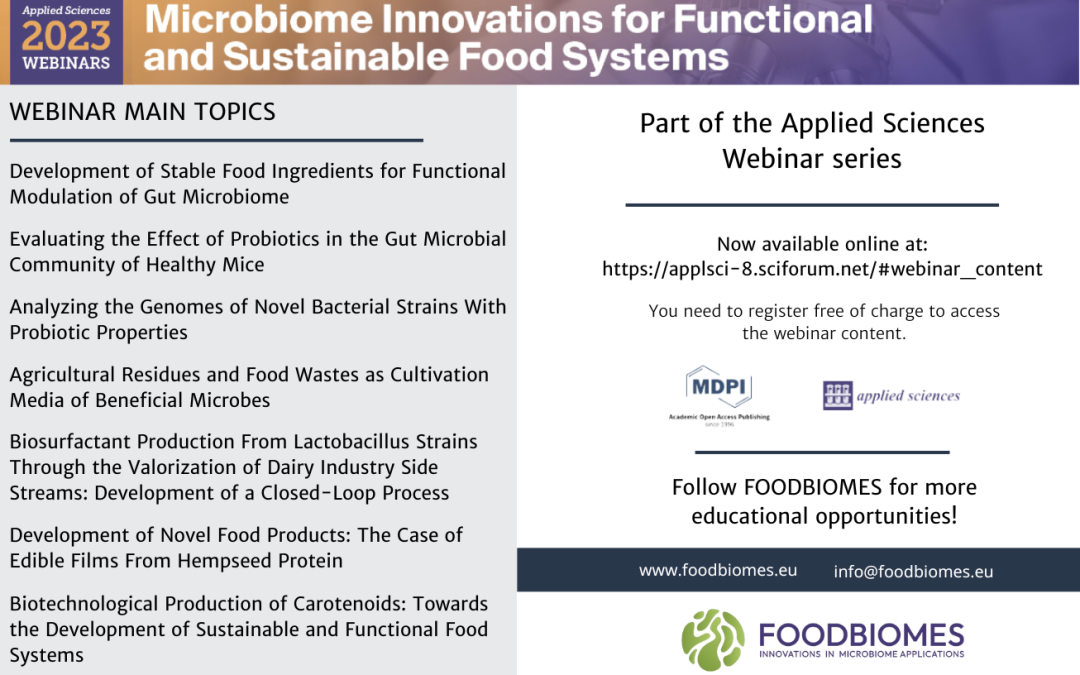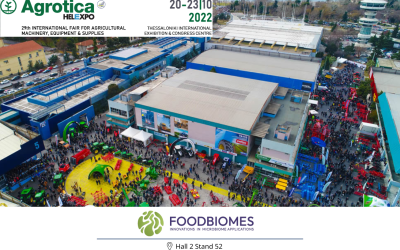The development of sustainable agri-food systems for innovative and safe microbiome products, services, and bioprocesses is one of the key priorities within the framework of the Circular Economy and European Green Deal. At FOODBIOMES the development of novel foods fortified with health-promoting microorganisms and natural compounds and obtained via biotechnological routes that can act as preventive and/or therapeutic tools, constitutes one of the main scientific goals.
On Friday, 20 January 2023, FOODBIOMES researchers shared the findings of their research on an online webinar entitled “Microbiome Innovations for Functional and Sustainable Food Systems” that was organized by FOODBIOMES in association with Applied Sciences and MDPI within the framework of the Special Issue, “Emerging Technologies and Innovations for Gut Microbiome Research”.
The webinar served as an interactive educational event in which our speakers focused on the current research and innovation trends of FOODBIOMES and in particular:
Ioanna Prapa discussed the effect of cell immobilization on the maintenance of probiotic cell viability; a property of vital importance for the development of food ingredients for the modulation of gut microbiome.
The next speaker, Ioanna Farmakioti, disclosed that following a 6-week intervention with the novel Lactiplantibacillus pentosus strain in healthy mice, the Firmicutes/Bacteroidetes ratio, as well as the families of Lachnospiraceae, Ruminococcaceae and Rikenellaceae were significantly increased, while the levels of triglycerides and ALT were significantly reduced.
Konstantinos Tegopoulos presented a bioinformatical workflow for the analysis of WGS data, which is expected to provide a better insight on the molecular mechanisms underlying health-promoting properties and constitute the basis for the development of high-throughput screening for the characterisation of novel effective probiotic strains.
Afterwards, Grigorios Nelios reported on the effective production of lactic acid bacteria (LAB) biomass with the use of liquid agro-industrial residues and wastes, contributing to the EU goals for Circular Economy and the Green Deal.
In the same context, Dimitra Alimpoumpa, elaborated on cheese whey valorization for biosurfactants production from LAB and bioprocess development for LAB derived biosurfactants, along with novel food applications within the circular economy.
Aikaterini Natsia commented on the development of novel protein-based products from hemp seeds and presented the properties of hemp protein films that are proposed as potential food-packaging material.
Lastly, Fani Sereti highlighted the potential of red yeasts for production of unusual carotenoids for use in novel functional foods.
We would like to thank our research teams for their work and our speakers for representing FOODBIOMES, and of course the Applied Sciences and MDPI for co-organising this special webinar.
You can now watch the whole webinar online following this link https://applsci-8.sciforum.net/#webinar_content. If you are having any trouble with the link above, please do not hesitate to contact us.
FOODBIOMES at Agrotica HELEXPO!
We are looking forward to meeting you in person at Stand 52 in Hall 2 in Thessaloniki International Exhibition & Congress Centre from 20 to 23 of October 2022 and to describe how FOODBIOMES can offer world class research, education and innovation services that can...
FOODBIOMES AT ICRI 2022
FOODBIOMES will be online for three days (19-21 October 2022) at the International Conference on Research Infrastructures (ICRI) 2022 - a biennial event that brings together stakeholders in the field of research infrastructures from all over the world. Our...
Our researchers at FFC International Conference!
Our researchers at FFC International Conference! FOODBIOMES participated at the 30 FFC International Conference that was held at Myrina, Lemnos, Greece on 23-25 September 2022. Pre-clinical data of new strains, natural extracts as food preservatives, wine-making with...




